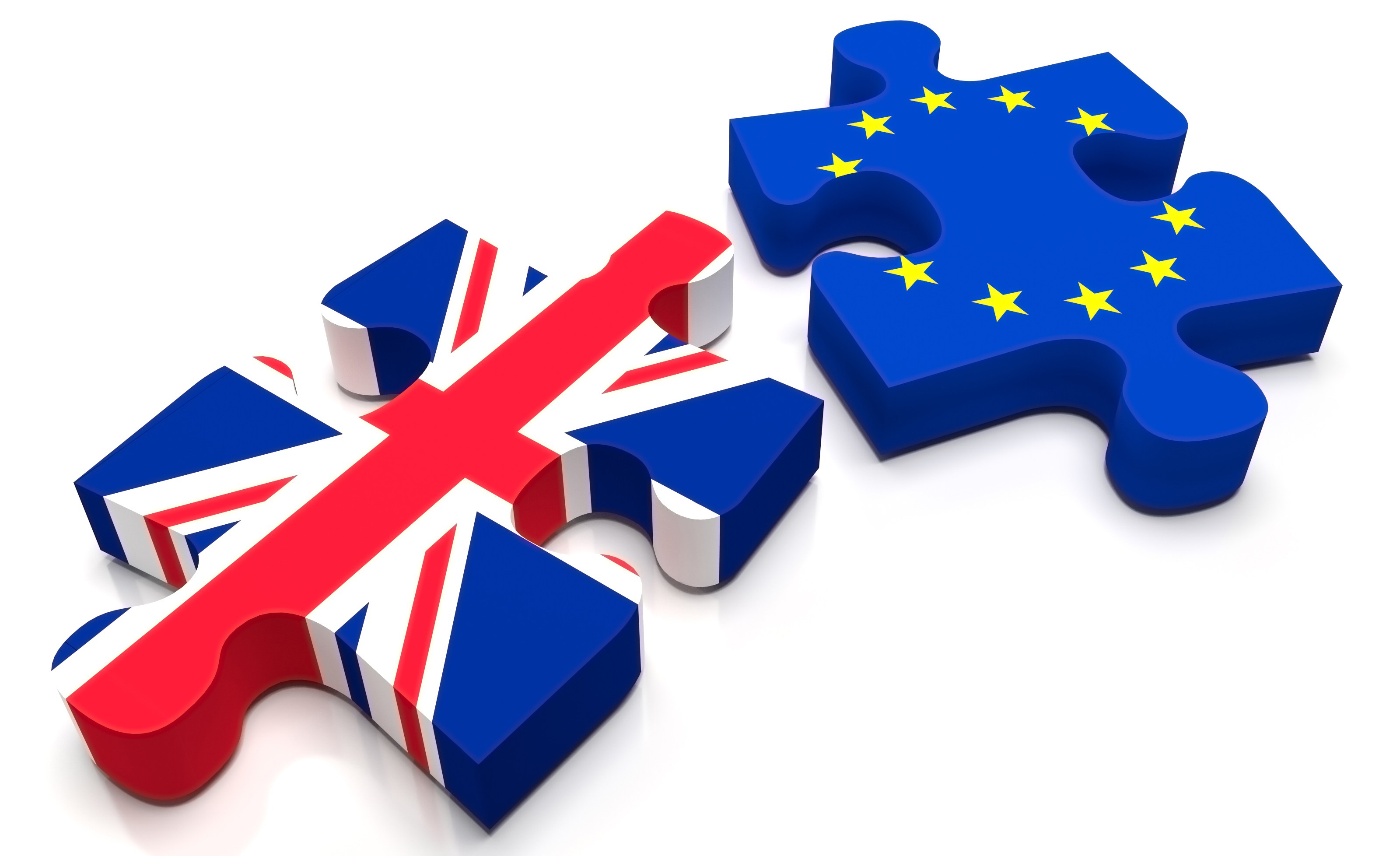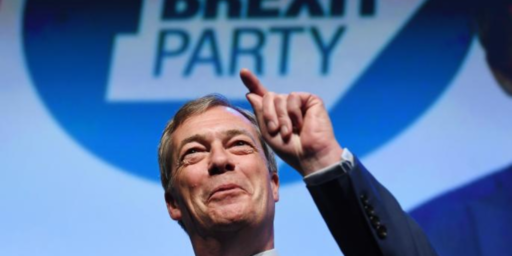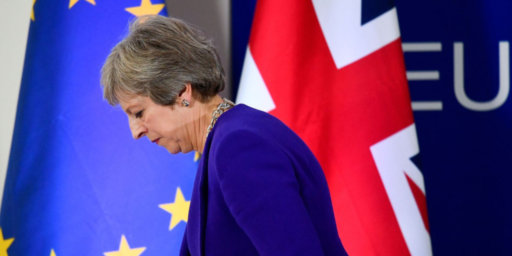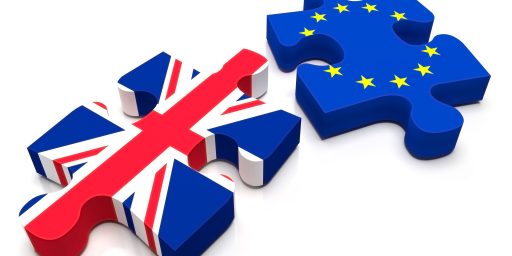Stumbling Towards The Brexit
There's no real plan and nobody appears to know what waits on the other side, but the United Kingdom continues to meander towards Brexit.

British Prime Minister Theresa May is hitting back on critics of her Brexit strategy:
Theresa May pledged she would not be “pushed into accepting compromises” on the Brexit plan agreed by her Cabinet in July that are not in the U.K.’s national interest.
In a bullish op-ed for the Sunday Telegraph ahead of the full return of the U.K. parliament she repeated her commitment to leaving the EU on March 29 next year and to fend off calls for a second referendum on the eventual deal.
But she hinted that the government’s proposal for future immigration arrangements with the EU would give the bloc’s citizens special access to the U.K. in return for better trade terms — something that would infuriate many Brexiteers in her party.
“Provisions for limited mobility arrangements are commonplace in other trade agreements. In the same way our proposed ‘framework for mobility’ is simply a way of supporting a trading relationship,” she said. But the prime minister added that “unfettered access to the UK” and the country’s benefits system would end.
May said that a no-deal scenario would be difficult for both sides and it was the government’s duty to prepare for it. “For some sectors there would be real challenges for both the UK and the EU. But we would get through it and go on to thrive. So we will be ready for a no deal if we need to be,” she said.
Also writing in the Sunday Telegraph, the former minister and Tory backbencher Nick Boles came out against the Chequers plan and what he predicted would be the “humiliation of a deal dictated by Brussels.”
Boles, who described himself as an “instinctive loyalist” who had never voted against the government, backed Remain in the referendum. He has previously supported the prime minister’s approach to Brexit.
From the Op-Ed itself, which is behind a paywall but you can gain full access by signing up for a free account):
Our White Paper proposals are a good deal for Britain. They will allow frictionless trade in goods and agricultural products, protecting the jobs that depend on just in time supply chains. Unlike alternatives, they will not allow the break-up of our precious Union; nor will they undermine the Belfast Agreement with a hard border between Northern Ireland and Ireland.
They will protect the shared security capabilities that keep us all safe. But they will end the vast payments to the EU budget so we can fund our long-term plan for the NHS. They will end the jurisdiction of the European Court of Justice in the UK, take us out of the Single Market, the Common Agricultural Policy and the Common Fisheries Policy. And they will take us out of the Customs Union so we can secure new trade deals around the world.
They will also end freedom of movement – and do not let anyone tell you otherwise. Provisions for limited mobility arrangements are commonplace in other trade agreements. In the same way our proposed “framework for mobility” is simply a way of supporting a trading relationship. With our Brexit plan, the era of unfettered access to the UK – and our benefits system – will be over. Britain will finally control its own borders.
We want to leave with a good deal and we are confident we can reach one. But, of course, there is still a lot more negotiating to be done. So it is only responsible that we have also spent time this summer preparing for a “no deal” scenario, just as the EU have done too. As the head of the WTO has said, no deal would not be the end of the world, but it wouldn’t be a walk in the park either.
(…)
For some sectors there would be real challenges for both the UK and the EU. But we would get through it and go on to thrive. So we will be ready for a no deal if we need to be. And I will not be pushed into accepting compromises on the Chequers proposals that are not in our national interest.
All of this comes, of course, as May is under increasing scrutiny due to a Brexit process that appears to be taking a lot longer than supporters of the “Leave” side of the 2016 referendum believed it would be and to the fact that many of the complications from that process are proving harder to resolve than previously promised. One of the most difficult issues that apparently was completely ignored by the “Leave” representatives, for example, was the issue of the border between Northern Ireland and the Republic of Ireland which, thanks to the fact that the U.K. and Ireland are, at least for the moment, both still members of the European Union, Once Brexit becomes official, the freedom of movement that British and European citizens have enjoyed between their respective borders would come to an end and, absent some sort of agreement, this would apply to the Irish border just as it would apply to the United Kingdom’s international airports, shipping ports, and, of course, the train and automobile traffic from the Channel Tunnel. With respect to the border between Ireland and Northern Ireland, though, there are fears that it could reignite the religious and ethnic strife that once plagued the region and ruin the peace that has held there for the better part of two decades.
Added into all of this is the fact that the current status of Brexit negotiations seems to have turned against May and her government, and that it’s not at all clear that the entire idea of leaving the European Union to begin with. Two months ago at the beginning of July, May lost both her Brexit Minister and Foreign Minister Boris Johnson over disputes regarding the speed of the Brexit process, a development that not only put the Brexit plan in doubt but also put a cloud over May’s political future that still has not lifted. Meanwhile, a survey released early last month showed that support for leaving the European Union, both among the general public and among Members of Parliament, had changed radically over the previous two years and that there may now actually be a majority of Britons who support remaining in the European Union.
Taking all this into account, May is obviously finding herself in a difficult position. The result of the 2016 referendum, as well as the current political climate inside the Conservative Party, make it next to impossible to back away from Brexit no matter how hard it is proving to be to negotiate a deal that isn’t going to cause some harm to the British economy and some kind of trouble in Ireland. At the same time, the actual public consensus for Brexit appears to be falling apart. Were circumstances different, this would be easy enough to deal with, but the current political climate in the United Kingdom does not bode well for a rational resolution of this dilemma, especially since the main opposition party is in the middle of a leadership crisis all its own. Given that, it seems clear that the U.K. will continue to stumble toward Brexit with no real plan and no idea of what waits on the other side.






Ready, shoot, aim.
A fine success for Russia — they’ve been on a roll lately.
The British government has made three promises that relate directly to EU membership. The one everyone talks about is the promise to abide by the Brexit vote.
Just before that vote, however, there was a referendum on Scotland leaving Great Britain. The British government campaigned heavily against that and promoted over and over again that if Scots left they would jeopardize their relationship with the EU. Put simply, they promised Scotland that remaining was the only way to guarantee continuity with the EU.
Finally, the Irish Troubles were resolved with a peace agreement predicated on an open border and free trade between Northern Ireland and the Republic of Ireland. This was, and remains, possible only due to GB’s membership in the EU. The nationalists will not accept a reimposed border dividing Ireland and the unionists will not accept a border between NI rest of Great Britain. The loud statements from the Conservative government that there will be no customs borders reimposed is so much puffery. If you don’t have customs stations then Ireland becomes a free-for-all where EU and British goods can be simply driven by the truckload across a dozen major highways.
May can talk all she wants about how noble she is for keeping faith with the Brexit referendum. But the reality is that no matter what they do they will be breaking faith with major portions of the population.
It seems to me that there is only one honorable course of action. Negotiate the best deal they can and put that to a new vote, with either “accept as is” or “Remain” as the only choices. Include in there all the realities: redivided Ireland; full tuition for British students attending European universities, work visas required and not guaranteed; Toyota and the other automakers gradually shuttering their UK factories and moving production onto the continent; the end of “The City” as a financial capital; and so on. Brexit was sold by, frankly, US Republican tactics. Essentially, facts don’t matter, only “winning”. Citizens of the UK should be given the chance to vote on reality, not the fantasies of loud mouths perched on a pub stool.
The current scallop war between English and French fishing interests is a portend for the UK after Brexit. The UK will face unfriendly relations with the main European economic powers, France and Germany. This has the potential for being bad.
Thanks to Marked Man for interesting information.
Napoleon must be spinning in his grave. All the effort, blood, and treasure he expended to isolate Britain from Europe was a failure, and just two centuries later the Brits are doing it to themselves.
The British ‘elite’ have been doing everything they can to undermine the democratic decision to Leave. Now they claim their failure to work toward Brexit is a reason to abandon the democratic resolution of the British people.
Recently, Uncommon Knowledge had a panel in Copenhagen to discuss the future of democracy. A bunch of EU politicians, Tony Clegg, who has been working hard to undermine the democratic Brexit, a Mexican deputy President and Canadian, Stephen Harper. It was absurd. Only Harper has any claim to be a friend to democracy. The EU, unhappy with the failure of the EU Constitution vote, abandoned democracy for its implementation so no EU leader can claim to support democracy.
If there is stumbling toward Brexit, it is due to those in the British establishment who have spent all their time trying to undermine democracy rather than honor the democratic decision. Not unlike those in the US who are working to undermine the democratic election of the President.
@JKB: So if you are all in on democracy, hold another election now that people know the truth of what Brexit really means, not the lies the Leave campaign foisted upon them.
Or would that make too much sense?
@JKB: This is rich. A Trumpoid attempting to lecture people on fairness and decency. You are ridiculous.
@JKB: Spare the ignoramus Trumpist spin.
The United Kingdom, which is indeed not just England but the Unified Kingdom, is a sovereign Parliament system and referendums, above all ones without proper balance between the Scottish, Irish and Welsh interests in contrast with the English is nothing more than a path to autistic destruction of the United Kingdom you ignorant git.
There is precious little democratic to a poorly organized referendum that itself overturned another poorly organized referendum on joining.
@JKB: so let them go off the cliff, you mean?
Well, I know who’s on the side of the Russians and it’s NOT me….
@MarkeMan:
Leave that aside, it is quite rich to pretend it is “elites” pushing no Brexit, rather than Brexit pushed by the blithering Twit wing of the Conservative elite. Or that carving into stone one Referendum result (Referendums mind you have no standing in the system, they are merely advisory) is democratic while using it to refuse another to opine on the actual Exit proposition, when the polls run against one’s idiot argument – the very opposite of “democratic” in the end.
@JKB:
That is so upside down and back to front it’s difficult to know where to begin dealing with it.
But let’s try anyway…
The government have been trying to implement the decision, with remarkably little real trouble from Brexit-sceptic Conservative MPs (probably the majority, depending on definition) who have consistently backed away from confrontation.
Govt. have had far more problems due to Brexiteer ERG group of Con. MPs and their insane “no deal” strategy.
This in turn is in large part due to PM May’s massive error in applying her (or rather her idiot former advisor Nick Timothy’s) “red lines” interpretation of the result (i.e. withdrawal from Single Market, Customs Union and ECJ Court) none of which is required to fulfil any mandate the referendum may be assumed to have. (Norway and Switzerland are both outside EU but within these).
(The idiot Timothy appears to have thought that these were necessary to pursue an anti-immigration strategy re. UKIP and brexity-Labour to win a decisive election victory. Oops.)
Labour leadership have committed to “respect” the referendum.
Media in general have been as expected; BBC not really questioning strategy though sometimes pointing out tactical problems; other broadcasters similar, press more supportive or critical from ERG direction, apart from Guardian and FT.
Civil Service have been trying manfully to follow political directions that are half the time incoherent, ineffectual, or just plain daft.
There is zero evidence of any elite conspiracy.
Eh? What?
I assume you mean the abandonment of the proposed EU constitution after French and Dutch referendums in 2005, which was then replaced by the Lisbon treaty, which was broadly similar in procedural effects but legally different as based on inter-governmental treaty and amendment of existing treaties rather than a new foundation.
EU enthusiasts preferred a Constitution; personally I always preferred the inter-governmental route from the viewpoint of political philosophy i.e. it maintains the E.U. as the creation of its states not a foundational entity (a confederation or league rather than a federation, in essence).
In practice it makes bugger all difference.
The STATES are where the power lies in the EU, (i.e. the formalities of the Council and the various forms of inter-state relations) not the Commission or Parliament. And it is from the states the democratic legitimacy of the EU stems.
For a rough analogy for Americans: imagine the USA comprised of:
– states with full right of secession
– only some states sharing the dollar as currency
– Washington only having effective control of internal and external trade and commerce, some areas of infrastructural development and aid for regional development, and co-ordination of states policies on employment, environment.
– states each having effective independence in e.g. education, health, taxation, welfare, foreign policy, defence (to the point of not all sharing same external alliances), policing (no equivalent to FBI or other federal level law enforcement) etc.
– reduce role of Supreme Court in accordance with above
– delete Senate
– severely restrict role of House even within above competencies
– replace elected President with (in part) collegial executive appointed by Council of States for administration/implementation and drafting legislation
– Council of States itself assumes parts of other roles of President and Senate, in directing/deciding policy (when the Council tells the President to jump, he asks “how high?”)
– or else those powers are outside Council authority under the treaties and reserved to the states
The error a lot of Brexiteers (and some Americans) make is trying to understand EU in terms of the UK or the USA i.e. the wider geographical power is somehow necessarily politically superior.
The EU is an instrument of the states, not their overlord.
P.S.
Personally, as a conservative (not a Conservative 🙂 ) I’d be inclined to say the whole Brexit mess illustrates why democracy is a good servant to the nation, but sometimes an awful master, if you are stupid enough to ask it the wrong bloody question.
(For which may history kick David “Cunning Plan”Cameron’s idiot arse from here to Lands End)
@MarkedMan:
The border impasse is surely May’s biggest headache. The Irish Republic, as an EU member can (and Vardakar has said will) veto any agreement that does not leave open the border between the North and the Republic. Since Northern Unionists are propping up her government she is literally between a rock and a hard place. Ireland’s Taoiseach won’t even take her calls to discuss it. Irish Unionists will take her down if she cuts and caves. Crikey, Tess. You’re well and truly screwed.